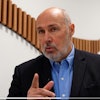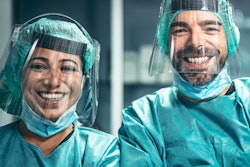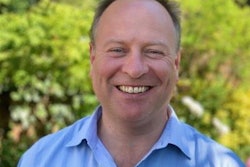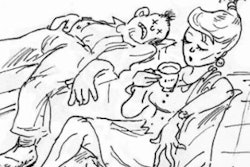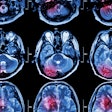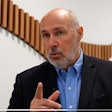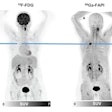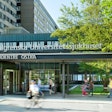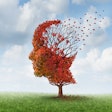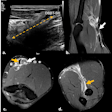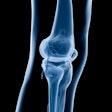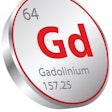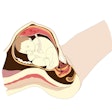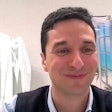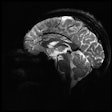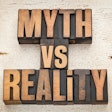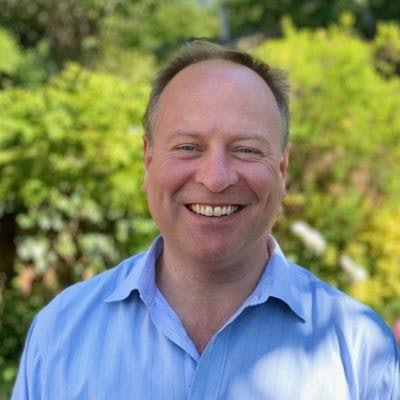
It feels like time has been turned back 15 years. We are reporting scans as they come off the scanner. But thousands are waiting to be done. I've plenty of time to talk with colleagues, to think, and to teach. There are fewer meetings and the multidisciplinary oncology meetings are mercifully short.
I reflected on this recently, and to my surprise, I realized that I was happy. I was back in love with radiology during a pandemic.
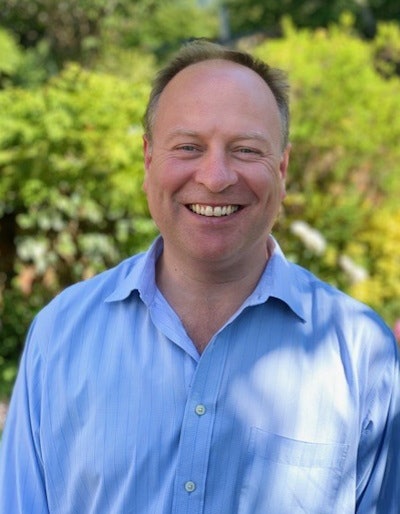 Dr. Paul McCoubrie from Bristol, U.K.
Dr. Paul McCoubrie from Bristol, U.K.But then I felt guilty. How can I be happy amid the misery of COVID-19? Is it wrong to feel joy in my work when so many countries are still in lockdown? After considerable reflection, I decided that appreciating the silver lining of a dark cloud is no bad thing.
There have been many upsides of the pandemic and not enough people have been talking about these. I'm not dismissing the suffering and tragedy at all -- the dark cloud is still very large and very dense. And the political fog surrounding it is quite toxic too. But the rapid serial changes in the way we work have been astonishing. In some cases, very positive.
In the U.K., radiology departments were like most of the National Health Service (NHS): spectacularly unprepared. However, I've been amazed by how quickly things can happen in a crisis. A brand new hospital built in 14 days? It normally takes 14 years. Breathtaking.
The lockdown here was lightning quick. One day it was business as usual, the next nothing. We've spent our time profitably. We cleared our reporting backlogs, as did others around the country. Within a few weeks, we'd cleared several thousand scans and were then hot reporting them. I'd forgotten what that felt like.
The volume of plastic aprons and rubber gloves that I have donned and doffed has been quite something. The sheer volume of single-use nonbiodegradable plastic makes me feel like an eco-thug. I complained to colleagues about the funny smell of the surgical masks. They replied that it was probably my coffee breath. A fair point, probably.
Farcical redeployment
Many hospitals redeployed their radiologists. For older consultants, this was borderline farcical, and people realized we were useless on the wards and sent us packing. I am so out of touch that I had forgotten which end of the stethoscope goes in your mouth.
Some of our trainees found the redeployment traumatic; it felt like they were being forced back to the clinical coalface, having deskilled significantly and feeling like a liability. Their memories of this pandemic won't be exactly rosy.
All conferences and study days have been canceled or have gone online. I must admit I am not the biggest fan of webinars and so forth. Don't get me wrong, they do have advantages. Particularly if both free and good. But suffering Death by Powerpoint was never my favorite hobby. Plus I nod off faster during a webinar than in a lecture, which is probably a bad thing.
The biggest sadness over canceled conferences is the lack of social contact with old and new friends. A coffee or beer with a like-minded scholar is a true pleasure. The lectures, to me, are to fill the gaps in between social occasions. When conferences restart, I shall not waste a moment between lectures ever again.
Guideline overload
One unique phenomenon of this pandemic has been the massive proliferation of guidelines. Everyone who was anyone started writing them. And then updated and expanded them weekly. I admit that I rapidly got guideline overload. I almost needed guidelines on how to cope with the guidelines.
After having read many of these, seeking guidance and wisdom, I soon realized that everyone else was making it up and hadn't a clue what they were doing either. I started to resent this mushrooming of guidelines. Particularly when they mandated all kinds of nonsense.
This annoyed me for a while until I remembered the words of journalist and author Christopher Hitchens: "What can be asserted without evidence can be dismissed without evidence." I then stopped reading guidelines and took a guilty pleasure in ignoring poorly constructed ones.
Major upside
The major upside to this pandemic has been the pause it has allowed. We have had time to critically look at everything we do. We've simply not had time for such introspection or been allowed to change things so easily. Issues that were normally blocked or stalled are now solved in hours or days. We've been encouraged to stop low-value investigations, which is music to my ears.
I predict we will look back on this time with bittersweet memories -- a time of much suffering, but a time when diagnostic radiology was very, very different indeed. We may even be nostalgic about it.
Dr. Paul McCoubrie is a consultant radiologist at Southmead Hospital in Bristol, U.K. Competing interests: None declared.
The comments and observations expressed herein do not necessarily reflect the opinions of AuntMinnieEurope.com, nor should they be construed as an endorsement or admonishment of any particular vendor, analyst, industry consultant, or consulting group.

